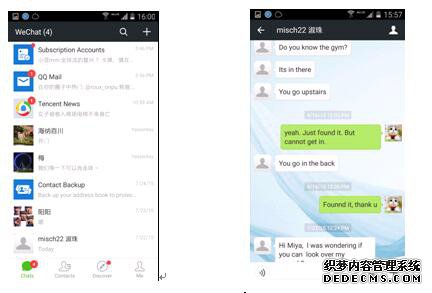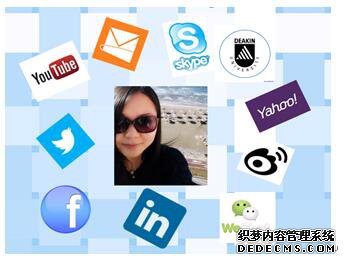|
Summarize总结
我的文章内容选择了两个主题作为组合:
1。您与特定在线社区的连接和交互
介绍Onlinde身份,为什么人们喜欢使用它们?
我使用的不同媒体和我在网上的不同身份。
我喜欢在网上做的事情,如跟踪新闻、看电影、与他人互动等。
2。建立/维持在线关系或网络的方式
不同的角色以及如何使用我的在线身份来创建和维护这些角色和关系。
显示证据/图像
My post content chosed two topic as a combination : 我的文章内容选择了两个主题作为组合
1. Your connection to, and interaction with, a specific online community Introduction about Onlinde identity, and why people like to use them ?1。你与一个特定的在线社区的联系和互动,关于在线身份的介绍,以及为什么人们喜欢使用它们?
The different media Im using and the differetn identities I have online.我使用的不同媒体和我在网上的不同身份。
The things I like to do online, like follow news, watch movies, interact with others etc.我喜欢在网上做的事情,如跟踪新闻、看电影、与他人互动等。
2. The way in which you form/maintain relationships or networks online 建立/维持在线关系或网络的方式
The different persona and how do I use my online identities to creat and maintain those persona and relationship. 不同的角色以及如何使用我的在线身份来创建和维护这些角色和关系。
showing the evidences/images 显示证据/图像
Digital Identity
Miya Zhang
Posted on July 27, 2015
The advent of network age constructs a new human living space and reshapes the model of interpersonal communication and interaction which gives people a special way of self-expression in cyberspace - digital identity. We have a new identity in the virtual but real space, which is quite a big progress for the whole society and the world. A person's online identity is more or less reflects his pursuit in real life, for the real life is the foundation of the virtual life. Digital identity is a kind of compensation of absent character on people, and is also a self-fulfilling platform which is affected by conformable psychology (Giles, 2011). Twitter and Facebook are two important platforms for the online identity. As what I often write in my Twitter are more about film, art, fashion and entertainment, which can generally reflect my online identity. I always follow this relative news on the Internet just because I fancy them. What I have done is the extension of the real me in the real society. The tweets bellows are the example:
My tweets examples:

Screenshot of my communication on WeChat
Online identity gives us a chance to shape a new self maybe a better self in virtual space, which gives more freedom and methods to make friends with others or discuss some interesting topics with some team members. We can easily find that our friends look better than usual or some overweight people look slim in the online picture of their own Twitter and other media. WeChat is effective in maintaining a good relationship with my friends on the Internet. The function of the communities of friends has been employed by increasingly more people to express themselves and marketing some kinds of goods. I always share some beautiful and cool selfies in my WeChat, which can satisfy myself in the deep inner. However I often find some funny or stupid photos of mine in my friends’ album. We always want to show the best part to people but we cannot control accident which could destroy our good profile. The good profile on the online platforms may be fake, but it has helped me to build good relationships with many more people in a short period of time, which can not be done in the real society, for I am not adept in expressing myself in the real world, especially when I take to someone face to face. Undoubtedly these photos including what I introduce myself in AboutMe is a way when people want to know me. It reflects my online identity (Gabriel, 2014). Online identities influence my real life and vice versa.
Image Example:
The left part from my WeChat album, right part from friend’s
Haven’t put images
Human being is a kind of social animals, who needs to express themselves in the society and live with the other units in the society. An individual is the basic unit in the society, and the online society provides human beings to communicate with others with various self-presentations online (Merrin, 2009). It is not the same with the self-identity in the real world. Therefore, people on the Internet can build a relationship with someone who is quite distant, and maintain the relationship by utilizing the Internet. This is just the reason why I fell in love with the online media in recent years. People create an online identity that they want to show you: the real one, the expecting one or the fake one. In reality, the relationship between people is like a series encounters which give people less thinking time and larger pressure, so people often be themselves in social activities, reflecting the background of themselves. However, network communication is like a battle needs more strategy which gives people more thinking time and smaller stress. They can even do what they want, which is beneficial to the maintenance of the relationship with others. So some people will present an ideal self in network. In order to satisfy desires, there appear some extreme personality --extreme unconstrained, extreme elegance, extreme vulgar, extreme gentleness etc. That is the complementarity of digital identity. People cannot get what they want in reality society, and they need their new digital identity to help them achieve their goals. They endow their digital identity more power. Actually, it is the digital identity gives them more strength, without which they may feel isolated or lonely in the real world.
However Back and other psychologists from The University of Texas at Austin have found that the information in the Facebook exactly show user's real character, rather than purely fictional one (Back, 2010). The personal data which bases on the social network brings a very accurately impression which is according to user's real personality, and it has nothing to do with user's ideal personality. One of the most accurate personality traits is extroversion, and neuroticism is the least one. When we fill out personal information, we write more about the truth instead of being what kind of person we want to be. People instinctively think that the real personal information can let more people know themselves, and have a desire to be understood. So they will give more information about their real life.

The image above shows the different applications and online media I use.
People also react differently when they use different media and applications. Those media and applications have different functions and influence. These distinctions allow me to show different persona of online identity. Till now I have a very specific usage of these media and applications. Deakin University page and email are more formal way to me. I use WeChat and Skype to communicate with friends. I just have and talk with friends I really know in the reality by these two applications. I am real who I am here. YouTube and Twitter are the other two platforms that I connect with others and the world. I follow and watch the information about film, art and entertainment and post a comment. Unbalanced relationship between follow and followed (Wood & Smith, 2005) is also the reason for my different persona. In YouTube and Twitter I talk few things about my own life, because less people follow me and they do not care about my life. Just famous people and interest thing attract public attentions. However, in WeChat and Skype I can talk with someone I really know and they are happy to know something about me.
People's behavior is completely different on online communities: some like the audience to search and watch information alone; Some see the online community as a platform to put personal opinion which directly become the source of information; There are some people just use the Internet to chat with friends (Poletti & Rak, 2014). Everyone plays a different role online to share and spread information. Online identity has different form: creators, conversationalists, critics, spectator, etc. These characters are not contradictory with each other. That is to say, people can have different roles at the same time or they can plays different role in different sites, such as I am an observer in YouTube and Twitter, and I am a joiner in WeChat and Skype. Obviously this intentional division of application gives me less chance to make new friends and get in other social hubs. So maybe in the future I will show and share more things about myself in Twitter.
References
Back, M. D. etc. 2010. Facebook profiles reflect actual personality, not self-idealization. Psychological Science, 21, p.372-374.
Gabriel, F., 2014, ‘Sexting, selfies and self-harm: young people, social media and the performance of self-development’, Media International Australia, 151, pp. 104-12.
Giles, Jim, 2011. The real you.(online identity for user groups). New Scientist, 212(2836), p. 50(3).#p#分页标题#e#
Poletti, A and Rak, J 2014, ‘Introduction: Digital Dialogues’, in Poletti, A and Rak, J, Identity Technologies: Constructing the Self Online, The University of Wisconsin Press, Madison, pp. 3-11.
Wood, Andrew F. and Smith Matthew J, 2005. Online communication linking technology, identity, and culture. New Jersey: Lawrence Erlbaum Associates.
|
 |
|||
| 网站地图 |

